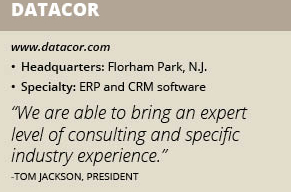
Datacor
In 1981 while working at Bell Labs, Dr. David Rosenthal took on a side project for a friend who owned a chemical manufacturing and distribution business. This friend was hoping to streamline his operations, so Rosenthal created a custom software package to run the business more efficiently.
This side project lead to the creation of Datacor and its enterprise resource planning (ERP) software for process manufacturers and chemical distributors called Chempax. Currently used by tens of thousands of users on a daily basis, Chempax is a highly sophisticated set of integrated applications that are used to manage the entire chemical business. “Starting out in New Jersey was perfect for us as New Jersey has its fair share of chemical companies,” Chairman Sean O’Donnell says. Since then the company has grown to have customers all over the world.
Wide Product Line
As technology changed, Datacor evolved from software on IBM mid-range computers to a combination of GUI and browser-based interfaces on a variety of devices.
Chempax address numerous business needs, including order processing, manufacturing, inventory management, production scheduling, warehouse management, plant maintenance and produces world class financials. “A lot of our customers use just our software with the Microsoft Office suite exclusively to run their business,” President Tom Jackson says.
In the late 1990s, the company began offering customer relationship management (CRM) software called eChempax. It is fully integrated with Chempax, which allows the sales team to access customers, products, pricing, sales data and notes in real-time.
The process manufacturers tend to fall into three segments: chemical, food and beverage. “They are then subdivided into a lot of different industry verticals such as “lubricants, adhesives, specialty chemicals, water treatment, and paints and coatings. It doesn’t matter what our customers make – if they are a process manufacturing business, then we meet their needs,” says O’Donnell.
The Process
 Due to the range of business management services Chempax offers, the sales team at Datacor must be proficient in multiple disciplines. “A sales rep needs to be able to talk to the CFO about the accounting side of things, to the customer service person about how they manage customers and to the plant manager about issues on the plant floor,” O’Donnell says.
Due to the range of business management services Chempax offers, the sales team at Datacor must be proficient in multiple disciplines. “A sales rep needs to be able to talk to the CFO about the accounting side of things, to the customer service person about how they manage customers and to the plant manager about issues on the plant floor,” O’Donnell says.
Datacor’s advantage is that it only sells to one industry, albeit one composed of many smaller vertical markets. “We are able to bring an expert level of consulting and specific industry experience,” Jackson says. “We can bring in best practices to our customers and work side by side with them to provide a solution that fits perfectly with their business model.”
The company has customers worldwide largely in the U.S., Canada and Mexico, but also in Europe, China, South Africa and other countries. Datacor has tens of thousands of users and that number is growing.
“Last year was a record year for us in new sales and number of employees hired,” Jackson notes.
Higher Expectations
O’Donnell observes that Datacor’s clients are “becoming more sophisticated. There are higher expectations of what they want out of their software application.”
In the early days of the company, he recalls, “Accounting got first dibs at computerizing. That’s not the case now – digitization has spread its reach in the organization. There’s more of an understanding of what the business is about and what each person’s part in the business is. Access to information is not restricted to inside the office anymore.”
There’s more focus on the operations side too and Datacor has expanded its offerings. For example, a batch ticket used to be done on paper.
“You’d give it to a person in the plant, who would mix the product and then write down on paper what they did, the yield, the materials,” O’Donnell says. “Now, a person takes a [computer] tablet into the plant and can record what’s happening in real-time. It reduces the number of steps it takes to comlete the equation.”
Datacor’s software has also helped in sales. “Sales reps used to have a binder, a map and a pocket full of coins to make sales calls,” O’Donnell says. “They would call the office constantly – ‘did so-and-so place the order? Do we have any inventory?’ Now, they can bring up data on their phones and see what orders have been placed, the inventory position of a product, and what the current price is in real-time.
Challenges of Growth
“As our customer base grows so does the number of features and functions within the software,” O’Donnell says. “This can create complexity through flexibility. We’re trying to provide a lot of flexibility and do it in a simplified manner.”
And that’s the challenge: “How do we keep adding features and functions and implement new technology but make it simple enough to use that it doesn’t require a lot of training?” Jackson asks. We’ve been successful so far and it is our top priority to build on that success.”